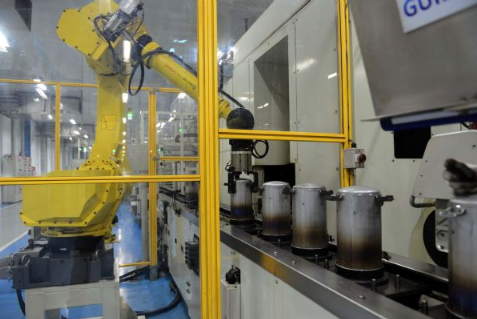What is the key foundation of RFID to build intelligent manufacturing?
Intelligent manufacturing attaches great importance to the transparency and real-time connection of production information, and the sensors that are the basis of data acquisition are indispensable in the construction of infrastructure. And every object in the factory can have radio frequency identification (RFID) technology such as "identity card". With the current price down, it is also expected to explode in multi-scenario applications, such as the current hot production history of intelligent manufacturing. Application, RFID can play a very important role in it.

RFID is mainly composed of an electronic tag (Tag), a reader (Reader) and a computer system. The digital data in the chip in the electronic tag is transmitted to the reader in a non-contact manner through wireless communication technology. The reader then sends the captured and identified information to the back-end computer application system for further processing, use, or value-added use of the data.
In addition to the ability to sense responses through reading, RFID also includes a write function, so in addition to transmitting messages to the outside world, by writing information, it becomes a storage space for related information, and it also makes objects seem to have more like "identity cards" "The function of product production history application can record the product price, assembly date, shipping factory, current location, etc.
Compared with traditional barcodes, RFID has many advantages, including fast scanning speed, can process multiple data at the same time, with data storage function, and the data can be updated and modified, reusable, oil and stain resistant. According to the analysis of the Economic Research Center of the Industrial Technology Research Institute, if the processing efficiency of manual, barcode and RFID for one data identification is compared, the results show that it takes about 10 seconds for manual and 2 seconds for scanning the barcode, and it takes only 0.1 seconds to identify through RFID.
RFID builds intelligent manufacturing foundation
RFID has a wide range of applications. Since the popularization of RFID, it was initially mainly used in logistics. However, it has been widely used in retail, logistics, transportation, medical treatment, and manufacturing. Although RFID is not a new technology, with the advent of the smart era, the industry has continued to develop various RFID application scenarios through market demand in recent years. In terms of intelligent manufacturing, in view of the demand for resources and cost efficiency, various manufacturers have begun to use RFID technology to achieve real-time location tracking, asset or personnel monitoring, production online process control and supply chain management.
For example, in the past, the production site of the manufacturing industry has a large proportion of manual interventions, often requiring manual recording of large amounts of data, resulting in low accuracy and efficiency. Therefore, manufacturers are now beginning to use the features of RFID writable information, as long as RFID readers are installed at the entrances and exits of production lines or production machines, when RFID tag-attached work orders or raw material carriers pass by, read The device will automatically read and record all the information of the product from entering the workstation to leaving, as well as the specific processing information of the original materials. In addition to eliminating the previous manual scanning process, which greatly reduces the labor cost or operation time, it also ensures that During mixed production, identify the correct processing program.
Outside the factory, the establishment of information sharing mechanisms in the upstream and downstream of the supply chain has become the future development trend of intelligent manufacturing. Now suppliers can also use this to obtain information on the logistics and marketing of their products, and draw up factory production plans accordingly to reduce the inventory of goods and control costs.
And every product from upstream supplier to downstream retailer can track the flow of goods through information sharing to reduce the cost loss caused by the wrong delivery, theft and damage of goods.
RFID is a technology that makes message processing more rapid and simplified, but how to apply the message more effectively in the future is where the value lies. The large amount of RFID data generated by the close interconnection of various devices needs to be effectively managed and analyzed, which also encourages RFID manufacturers to continue to innovate to seize this wave of opportunities, such as the development of tags with higher memory capacity and the BI layer Software platforms, and cloud-based solutions, or further fully integrated with IT systems such as ERP, MES, PLM, etc.
If you want to know more, our website has product specifications for RFID , you can go to ALLICDATA ELECTRONICS LIMITED to get more information

